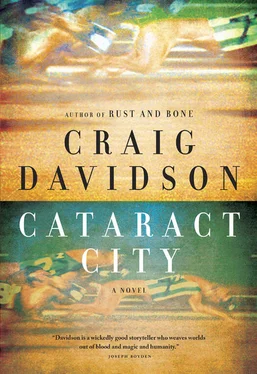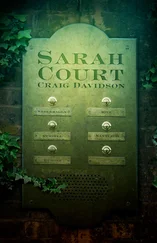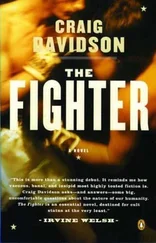By this time, my post-fight euphoria had soured. I toted up the facts of my life: I was jobless, wifeless, childless, living with my parents, sleeping in the bed I’d slept in as a boy. I was an ex-con with a busted face whose joints ached on humid days.
One evening I sat with my dad at the Tannery on Stanley Avenue. We could pass hours in a silence that wasn’t uncomfortable. Every so often one of us might sit up on our elbows and lean forward in a way that invited conversation, only to signal the bartender for another draft.
“Dade Rathburn,” Dad said, frowning at the foam in his beer glass. “That time he took you and little Owen.”
His shoulders rose almost imperceptibly. I was struck by just how sharp his shoulder bones were, by the chip in his canine tooth he’d never bothered to fix. I thought back to that night in the parking lot when Dad fought Dean Hillicker — he’d been pure electric back then. But the electricity had mostly bled out of him now.
“We got in the car,” Dad said, “Cal Stuckey and me. Cal’s car, remember? The flashy Fifth Avenue he got after his promotion. We’d been sitting in the precinct with officers buzzing around, asking a lot of questions but not taking any action. We both knew it … if you weren’t found, it would have been over. I mean all of it. Don’t want to sound dramatic, but … how can you be overdramatic, talking about your twelve-year-old boy? We couldn’t have lived with ourselves, y’know? Our wives, your mothers, we couldn’t have looked them in the eye, or they ours. The most important thing on earth ripped away —on our watch .
“Anyway, we got in the car. Drove. Hoping , was all. Guess we figured we’d find you on the side of the road somewhere, lost, hugging onto each other, but safe and in one piece. Cal kept whispering this little prayer to himself, I remember, telling God he could take away everything else he’d ever given but just give Cal his kid back … You forget the details of these things. It’s a trick your mind plays. All you remember is that fear —that’s all you ever need to remember to make sure it never happens again.”
It was the longest speech he’d given in my presence since junior high, when he’d come to my room at Mom’s insistence, hands squeezed into white knots to fumblingly explain the birds and the bees.
“You never found us,” I said.
Dad laughed. “We ran out of gas. Neither of us was watching the needle. Cal had to call CAA.”
The Sabres were getting clocked by the Wings in an early-season game on the bar’s TV. Dead leaves skated up and down the eavestrough outside, a haunting sound.
“Some people say you make your own luck,” Dad said. “I’ve never believed in that. Luck is just something that happens. It’s nothing you can pull towards you. But I think if you get some, you do your best to make the most of it.”
“What luck have you ever had?”
Dad flinched as if I’d reached over and slapped him.
“I’ve had plenty,” he said hoarsely. “What kind of question is that? Jesus, wasn’t I just saying …?”
“I’m sorry.”
“Son, you’re out . That’s lucky. You’re in one piece. That’s lucky, too. You disappear a few weeks, come back with a busted face and a limp — you don’t need to explain nothing — and maybe that’s good luck or bad luck, I dunno. But your mom and me, we don’t want to see you go back where you’ve been. So take your luck and make something of it. A small something. Start with that.”
Eventually we walked home, Dad swaying ever so slightly. He tripped on the cracked tarmac leading up to the house, leaned into me and held that position, his head resting lightly on my shoulder.
The next night I returned to Bender Street and used the pay phone outside the Sleep Easy Motor Inn. Late-autumn midges clustered around the street lamps. Winter was threaded into the wind that wicked up from the Falls. A roll of quarters sat heavy in my pocket — I had taken some money from where I’d stashed it under the closet floorboards of my childhood bedroom — because who knew? Maybe we’d talk a while longer this time.
“You again.”
“Yeah. Me.”
I wanted to ask Ed why she’d kept this number, after all these years. I wanted to know how close she was; I knew she wasn’t in Cataract City, but maybe she wasn’t so far away. I wanted to know if she was happy and in love with someone else. I wanted to know if Dolly was lying beside her as she listened to me breathing down the line.
“It’s weird without you” is all I said.
She almost laughed, but caught herself. “Is that your idea of a charming pickup line?”
Ed knew I’d never had anything in the way of pickup lines, charming or otherwise. “I’m just telling you how I feel.”
“Well, you’ve had some practice of being without me by now. You should be used to it.”
“How could I get used to it, Ed? It’ll always be the worst.”
“You’ll live.”
Yeah, I would. But I wished she weren’t so hard — I wished she’d give , just the tiniest bit. Then again, I didn’t deserve her softness.
“I’d like to come find you.”
After a silence, she said, “I can’t stop you from trying.”
She knew differently, though. All she had to do was tell me to stop. But she didn’t.
LIONS IN WINTER: OWEN STUCKEY
I thought about it a lot during those years when Duncan was in jail. “The Point,” I guess you could call it.
What was the Point? That place in time where you’d been led, ceaselessly and unerringly, since the day you could first remember. The place you’ll see sometimes in dreams, as familiar as if it belonged to your everyday life, that disappears the moment you rise into waking, its imprint washed away like footprints in the advancing tide. Then one day you’ll see some aspect of it in the filigree of a leaf or the knitted steel of a suspension bridge, and that old dream will collide with reality so perfectly that it creates the whiplash we know as déjà vu.
In dreams I often found myself in the middle of what, in my waking hours, I knew to be the Niagara River. But this was a different river, I understood — a river of dreams, and it acted according to its own logic. When I kicked for shore a ripcurl would run under my feet, pulling me back to where I’d started. So I just drifted, treading water, but the shore drew no closer and pulled no further away. My sightline never changed: a hawk sat stunned above me, pinned to the blue sky like a butterfly in an entomologist’s book.
In this dream, it dawned on me that nothing I did made any difference. As hard as I’d kick, that sly ripcurl always drew me back. When I treaded water, the current anchored me in place. My position was fixed — the river muscled and shoved and buffeted me into the exact spot where I was always supposed to end up — and nothing I did could ever alter that.
The Point is your specific place in the world. And not just your place: your moment. An instant in time, measurable in seconds, that acts as the hinge for everything you’ve ever done. Everything feeds into that moment: your backlog of experience and behaviours determine how you enter that moment and how you’ll walk away from it afterwards. Every way you’ve ever been hurt, every grievance nursed, every secret fear, those moments where you’ve stood up or stepped down and all the love in your body — it all matters when you reach the Point. It is all brought to bear.
And you’ll look back in the aftermath, trying to piece together how A met B, but you know what? The threads are tangled, yet the links exist in ways you can’t even imagine. And whatever you owe, you pay.
The Point. It’s in the water; it’s in the sky. Things collapse into it, things spring from it. We’re all either moving towards it or walking away from it.
Читать дальше












